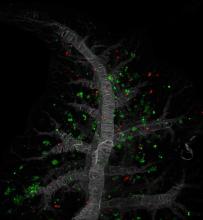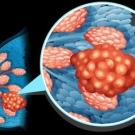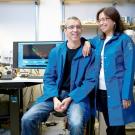News
The Role of Common Risk Factors in ER-positive, ER-negative Breast Cancer
Karla Kerlikowske, MD, and team recently published a paper in the Journal of the National Cancer Institute that examined the role of common risk factors in the development of ER-positive and ER-negative breast cancers. The study sheds new light on how a woman's age, weight, and menopausal status
Search Engine: How Artificial Intelligence Techniques Are Aiding the Hunt for New Drugs
A better cure for cancer – and other illnesses – could already be in existence, hidden right under our noses. The problem is that possible new lifesaving drugs are created much faster than scientists can study them. Millions of untested compounds wait, jumbled together in no particular order in vast
UCSF Experts to Share Latest Research at 2017 Precision Medicine World Conference
For the second consecutive year, UC San Francisco is co-hosting the Precision Medicine World Conference (PMWC), which is being held in January 2017. Precision Medicine World Conference The annual forum brings together experts to speak about the latest findings across health care, data and
Year in Review: 2016
2016 has been a year of growth, partnerships and progress at the Helen Diller Family Comprehensive Cancer Center. Our researchers and clinicians, patients and families, community groups, and government and industry partners continued working to make cancer a manageable disease. Please take some time
Many Safety Net Patients Don't Complete Colonoscopy after Abnormal Stool-Based Colorectal Screening Test
Nearly half of the patients in a safety net health system who had an abnormal stool-based screening test for colorectal cancer failed to receive the recommended colonoscopy within a year, despite the benefits of an integrated health care system with access to colonoscopy and shared electronic health
Community-based Health Outreach Increases Chinese-American Colon Cancer Screening Rates
Education by community-based non-professional health workers significantly increased colorectal cancer (CRC) screening rates among mostly non-English-speaking, older Chinese-Americans in San Francisco, according to a study led by researchers at UC San Francisco. Distribution of a brochure on CRC
New Targeted Chemotherapy Technology Proves Effective in Mice
UC San Francisco researchers have developed a new variety of targeting system for chemotherapy drugs based on the unusually high free iron content of many cancer cells — distinct from the protein-bound iron that is common throughout the body’s cells. In experiments in mice and cancer cell lines, the








